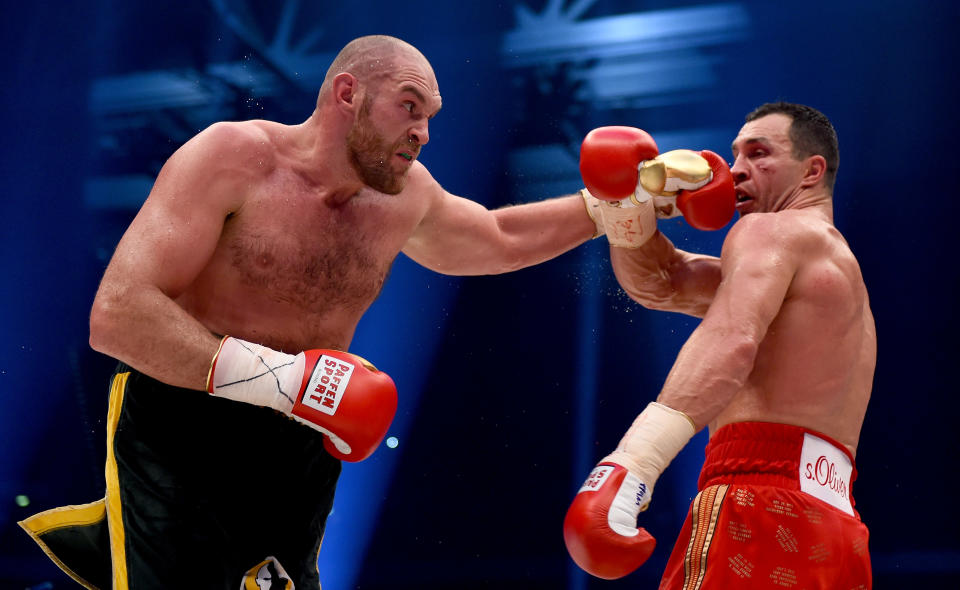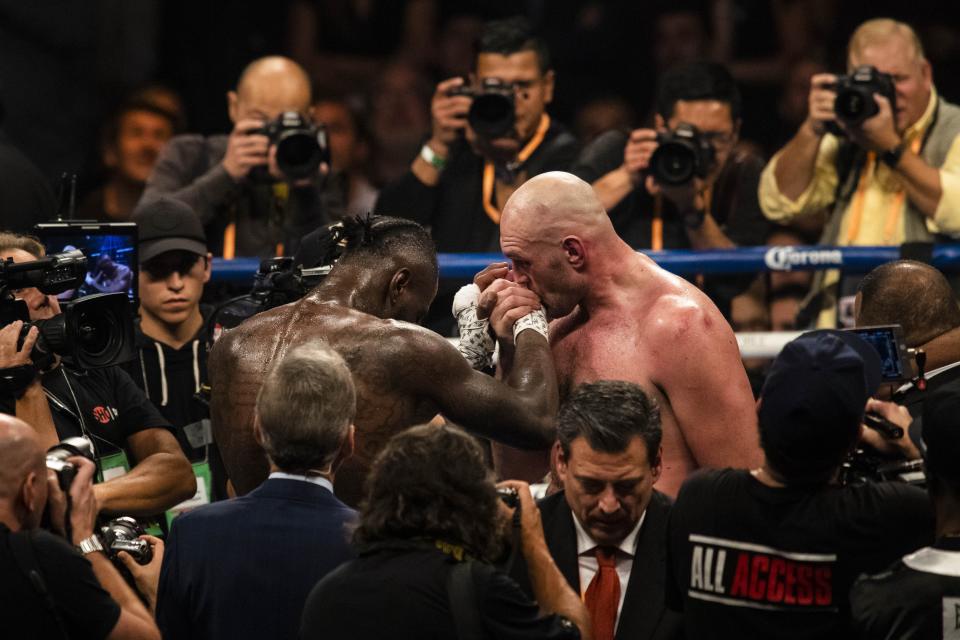Tyson Fury isn't just an elite boxer, he's also a terrific storyteller
LAS VEGAS — Tyson Fury has a storyteller’s mentality. He understands that it isn’t just the words that he speaks that make the moment, it’s timing and the way he delivers them that really matter.
The lineal heavyweight champion, the man who beat the man who beat the man, has come to what is nominally the Boxing Capital of the World to try to resurrect what for years had been a moribund division.
There’s an old saying in the sport that still carries a lot of truth today: “As go the heavyweights, so goes boxing.” For the first time in roughly a quarter century, there is intrigue in the heavyweight division.
Fury (27-0-1, 19 KOs) is one of the so-called “Big Three,” along with WBC champion Deontay Wilder (41-0-1, 40 KOs) and former IBF-WBA-WBO champion Anthony Joshua (22-1, 21 KOs). Andy Ruiz Jr. crashed the party by virtue of a seventh-round knockout of Joshua in a monumental upset on June 1 in New York.
Fury will make his Las Vegas debut on Saturday on ESPN+ when he faces unheralded Tom Schwarz at the MGM Grand Garden.
He’s coming off a memorable draw in Los Angeles with Wilder, in which he survived two late knockdowns, including one in the 12th round in which he seemed to be out cold.
To get that Dec. 1 fight with Wilder, Fury determined he needed to sell Wilder and manager Al Haymon a bill of goods. Wilder and Joshua had, for several years, been dancing around each other hoping to land a bout that would have paid each ungodly sums of money, but for whatever reason, they weren’t able to come to terms. Fury wasn’t part of that dance because he ballooned to 400 pounds as he battled mental health issues that plagued him all of his life not long after winning the bout by upsetting long-time champion Wladimir Klitschko.
How Fury’s dream fight turned into a nightmare
After shocking everyone but himself on Nov. 28, 2015, in Dusseldorf, Germany, when he routed Klitschko to win the IBF-WBA-WBO belts that Ruiz won from Joshua, Fury was overcome by his mental health issues.
“I’ve suffered with mental health problems all my life, from when I was a little kid,” the 6-foot-9 Fury said. “I had depression and anxiety, and I never knew what it was. I didn’t see any doctors about it until right after the Klitschko fight. It was a terrible time for me.
“You’d think being heavyweight champion of the world, undefeated and having everything a man could ever dream of would make you happy, but I’m living proof that it doesn’t. It doesn’t make you happy. I think when you struggle with mental health, no matter what you have in the world, it doesn’t make you a happy person.”

For years, he dreamed of becoming champion and told anyone who would listen that he could lick any heavyweight alive.
In 2015, his dream became a reality as he earned the bout with Klitschko, but life was anything but a dream for him.
“The thing is, now I’m not in a depression, but going into the Klitschko fight, I didn’t want to live any more,” Fury said. “Afterward, I was like, ‘I’ve achieved all me dreams now. Now what?’ I didn’t feel like I had anything to do any more. That was the end of my life, really, because I put all me eggs in one basket and I wanted to beat Wladimir that much for such a long time that when I finally did it, I was like, ‘OK, what’s next? There’s nothing else. Is that it?’ ”
Not long after beating Klitschko, Fury decided to end it all. He ballooned to over 400 pounds. He was living a life he says “I’m not proud of,” and was literally eating and drinking himself to death.
He was also doing drugs. They were slowly killing him, but he wanted to end it more quickly. So he squeezed into his Ferrari and took off down a lonely stretch of road near his home. The car was moving at a high rate of speed and he was planning to drive into a support structure of a bridge to kill himself.
“I was driving very quickly towards a bridge at the end of a long road,” Fury said. “I was about three seconds from it being over and I heard a voice in me mind say, ‘Don’t do this. You’re going to leave your kids with no father and it’s going to be a terrible time for your family. You’re going to destroy your family.’ I immediately pulled over. I was shaking. That was the time I finally got proper medical advice.”
He keeps you on the edge of your seat as he tells the story, the same way you can’t take your eyes off him in the ring.
Fury mounts his boxing comeback
He’d been out of boxing more than two-and-a-half years when he came back on June 8, 2018, to defeat Sefer Seferi. After an Aug. 18 win over Francesco Pianeta, he knew it was time to make his move. He wanted a piece of Wilder, and felt he’d be able to win the fight fairly easily.
But he also figured he’d have to undersell himself, because Wilder’s team was focused on landing a fight with Joshua, and didn’t want anything to get in the way of that.
“They were banking on me being nowhere near the fighter I was,” Fury said. “I told his manager I was nowhere near the fighter I was. I sort of had to goad him into it, tell him a load of rubbish to make him want the fight. I soft sold him the idea of beating Tyson Fury. Good salesman.”
Fury is many things — an elite boxer and a terrific storyteller being chief among them — but he’s a classic salesman.
He got the fight even though he believed in his heart that he had the perfect style to foil the aggressive and hard-charging Wilder.

But the fight with Wilder is only a blip on the map of his life story. He’s impossibly relaxed in the ring with a pair of gloves on his hands. He moves quickly and agilely and has an unmatched sense of timing in the ring.
When he first decided to begin training after he’d surpassed 400 pounds, he was beating all the best heavyweights in the area in the gym.
Fighting comes naturally to him.
From the time he started training as a little boy, he was always happiest when he was fighting and when he was working out. When he had problems in his life, he’d go for a run and he always felt better upon his return.
He’s fit and trim now, and looks like he could box 36 rounds on Saturday. He’s got a different outlook on life since he’s gotten help, and he’s able to show his full personality.
He’s a massive favorite to defeat Schwarz, at -4000, at the MGM Grand sportsbook. He’s asked repeatedly about Schwarz’s ability and he gets that in selling the fight, people are coming to see him.
He’s not taking Schwarz lightly, he insists, because he’s not going to allow what happened to Joshua against Ruiz to happen to him.
He signed with Top Rank hoping that it will help increase his profile in the U.S. and make subsequent fights with Wilder and Joshua even bigger.
As he’s walking through the Top Rank offices, surrounded by three burly security guards, he jokes about it.
“I can’t tell you exactly how it’s going to go, other than it will end with me victorious,” he said. “But I promise you one thing: No matter how it goes, you aren’t going to hear people demanding their money back. They’re going to buy a ticket because they want to see a show, and believe you me, a good show is what they’re going to get.”
More from Yahoo Sports:


